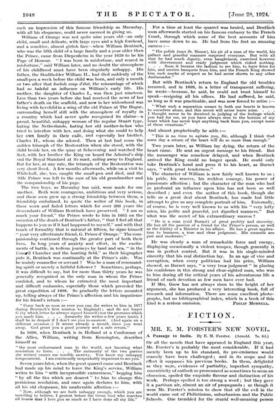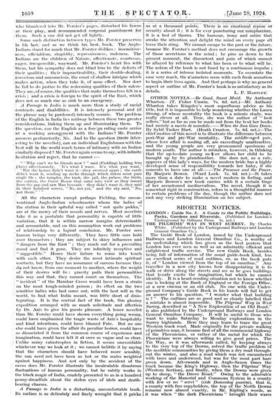MR. E. M. VORSTER'S NEW NOVEL.
A Passage to India. By E. M. -Forster. (Arnold. 7s. 6d.) OF all the novels that have appeared in England this year, Mr. Forster's is probably the most considerable.. If it had merely been up to his standard, its ,pre-eminence would scarcely have been challenged ; and in its scope and its effect it surpasses his previous -books. - in them, delightful as they were) evidences of partiality, imperfect sympathy, eccentricity of outlook so pronounced as sometimes to seem an obsession, spoiled the exquisite flavour and distinction of his Work. Perhaps spoiled is too strong a word ; but they gave it a partisan air, almost an air of propaganda ; as though it were Mr. Forster's mission to show that all the evil in the world came out of Philistinism, suburbanism and -the Public Schools. One trembled for the stupid well-meaning person who blundered into Mr. Forster's pages, disturbed his fawns at their •TkaYi.:: mitt weIN:ftirmqcci -corporal .punishment for ; them. Such a one did not get off lightly.
Some such distinction between types Mr. Forster preserVes An his last,' and • as we think his beSt; book: • The:;Anglo- Indians stand for much that-Mr. Forster dislikes insensitive- - ncss, officialdom, stupidity, repressiveness, rudeness. The • :Indians are the children of Nature, affectionate, courteous, eager, irresponsible, wayward. • Mr. Forster's -heart lies with them, but his sympathy does not blind him to the defects-of their qualities ; their impracticability, their double-dealing, Conscious and uneoriseions, the crust of shallow intrigue which ; Wakes action, when they take it, of none effect. Nor does
• he 'fail to do justice to the redeeming qualities of their rulers. They are, of course, the qualities that make themselves felt hi a ;crisis ; and a crisis is foreign to the spirit of the East, which does not so much rise as sink to an emergency.
A Passage to India is much more than a study of racial contrasts ;and, disabilities. It is intensely personal. and (if the phrase may be pardoned) intensely cosmic. The problem Of the English in India lies midway between these two greater bonsiderations, linking them up and illuminating them. To I the question, can the English as a foreign ruling caste arrive at a working arrangement with the Indians ? Mr. Forster answers perfunctorily; No. And to- the question (more inter- esting to the novelist), can -an individual Englishman with the hest will, in the world reach terms of intimacy with an Indian Similarly disposed ? Mr. Forster again seems to say, with infinite hesitation and regret, that he cannot :—
" Why can't we be friends now ? " said. (Fielding) holding him (Aziz) affectionately. It's what I want. It's what you want.'
But the horses didn't want it—they swerved apart ; the earth didn't want it, sending up rocks' through which riders must pass single file ; the temples, the tank, the jail, the palace, the birds, the carrion, the Guest House that came into view as they issued from the gap and saw Mau beneath they didn't want it, they said In their hundred voices, " No, not yet," and the sky said, No,
`All the characters except perhaps Fielding, the uncon- ' ventional Anglo-Indian schoolmaster whom the ladies of the station in their spiteful way called " not quite pukka," are at the mercy of their moods and nerves. Most novelists take it as a postulate that personality is capable of little variation, that it is within narrow margins determinable • and accountable, and on this assumption work out problems of relationship to a logical conclusion. Mr. Forster sees human beings very differently. They have little sure hold over themselves ; they are subject to skiey influences and . " dangers from the East " ; they reach out for a prevailing ! mood and find it gone. They are infinitely receptive and "suggestible." Hence their failure to come into touch . with each other. They desire the most intimate spiritual contacts, but they have no assurance' of success because they do not know, from one moment to another, where the weight of their desires will lie : gravity pulls their personalities . ' this way and that, they cannot count on themselves. The " incident " of the Marabar Caves would have been a strain on the most tough-minded person ; its effect on the two sensitive ladies who had come out, with the best will in the world, to find what India meant, was little short of disin- tegrating. It is the central fact of the book, this gloOrny expedition arranged with so much solicitude and affection by Dr. Aziz to give his guests pleasure. A lesser novelist - than Mr. Forster could have shown everything going wrong, - could have emphasized the tragic waste of Aziz's hospitality and kind intentions, could have blamed Fate. But no
one else could have given the affair its peculiar horror, could have so dissociated it from the common course of experience and . imagination, could have left it at- once so vague and so clear. Unlike many catastrophes in fiction, it seems unavoidible whichever -way we look at it ; we cannot belittle it by saying that the characters should have behaved more sensibly, the sun need not have been so hot or the scales weighted against happiness. And not only by the accident of the caves does Mr. Forster illustrate the incalculable disastrous fluctuations of human personality, but he subtly works in the black-magic of India, crudely presented to us in a hundred - penny-dreadfuls about the stolen eyes of idols and death- - bearing charms.
4 Passage to India is a disturbing, uncomfortable book. Its surface is. so delicately' and finely wrought that it pricis us at a thousand points., There is no emotional repose or security about it ; it is for ever puncturing .our,Cornolabence, it is a bed of thorns. The humour, irony and satire that awake the 'attention and delight the mind on every page all leave their sting. We'cantiOt escape to the past or the future, because_ Mr. Forster?s method does not encourage the growth of those accretions its the mind ; he pins us down to the present Moment,- the discontent and pain of which cannot
. be allayed by reference t0 what has been or to _what will be. The action of the book is not fused by a continuous impulse ; it Is' a series of intense isolated moments. To overstate the case very much, the eiaracters seem with each fresh sensation to begin their lives again.. And that perhaps is why no general aspect or outline of Mr; Forster's book is so-satisfactory as its















































 Previous page
Previous page